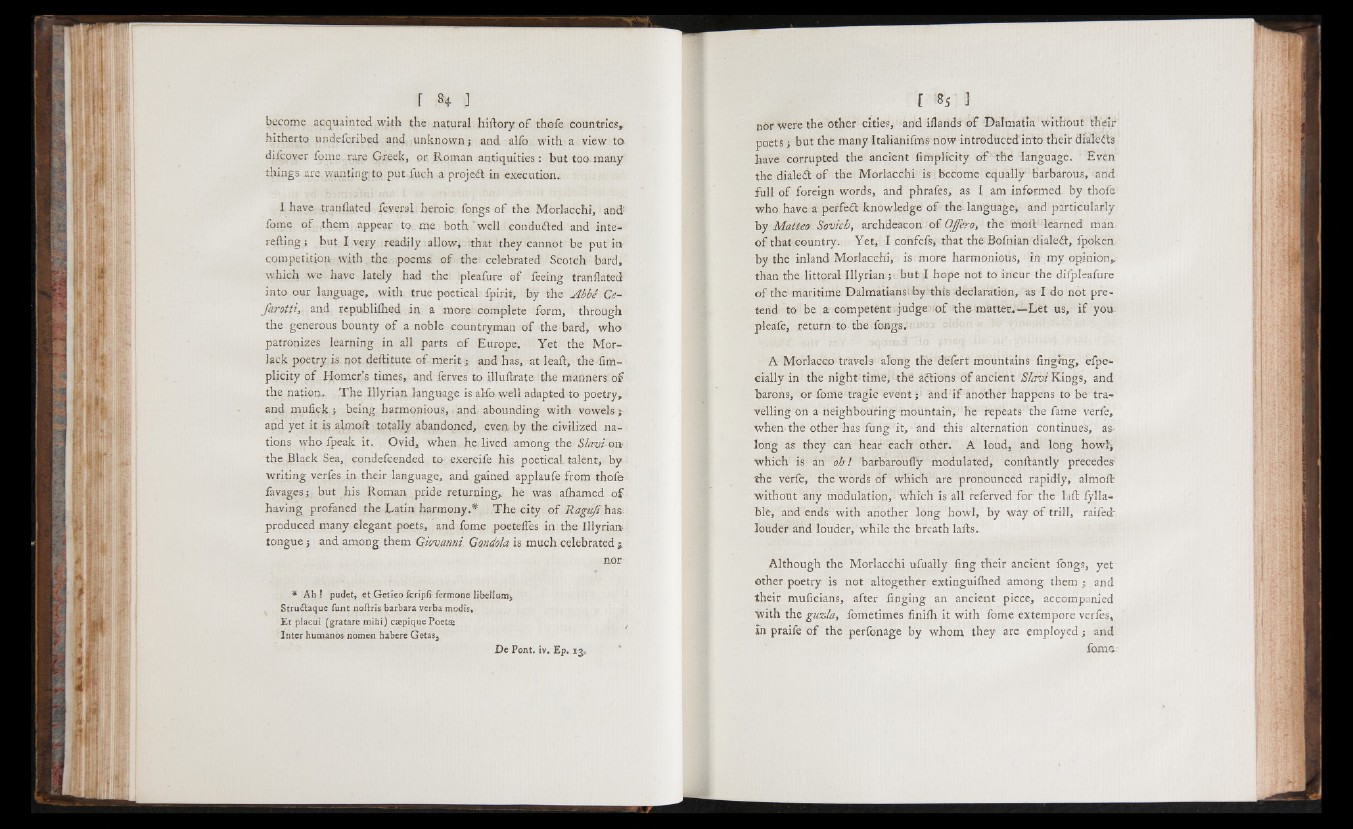
become acquainted with the natural hi (lory o f thofe countries,
hitherto undefcribed and unknown ; and alio with a view to
difcover foine rare Greek, or Roman antiquities: but too.many
things are wanting to put fuch a projedt in execution.
I have tranilated feveral heroic fongs o f the Morlacchi, and;
fome of them appear to me both 'well conduited and inte-
reiting ; but I very readily allow, that they cannot be putin
competition with the poems o f the celebrated Scotch bard,
which we have lately had the pleafure o f feeing mandated
into our language, with true poetical fpirit, by the Abbé Ce-
J'arotti, and republiihed in a more complete form, through
the generous bounty o f a noble countryman o f the bard, who
patronizes learning in all parts o f Europe. Yet the Mor-
lack poetry is not deflitute o f merit ; and has, at lead, the fim-
plicity o f Homer’s times,, and ferves to illuilrate the manners o f
the nation. The Illyrian language is alfo well adapted to poetry,
and mufick ; being harmonious,»and abounding with vowels j-
and yet it is almoft totally abandoned, even by the civilized nations
whofpeak it. Ovid, when he lived among the S lavion
the Black Sea, condefcended to exercife his poetical, talent, by
writing verfes in their language, and gained applaufe from thofe
favages ; but his Roman pride returning, he was alhamed o f
having profaned the Latin harmony.* The city o f Ragufi has.
produced many elegant poets, and fome poetelfes in the Illyrian
tongue i and among them Giovanni. Gondola is much celebrated j
nor
* Ah ! pudet, et Getieo fcripit fermone libellum*
Stru&aque font noftris barbara verba modis.
E t placui (gratare mihi) cæpique Poetæ
Inter humanosnomen habere Getas3
De Pont, iv. Ep. 13,,.
nor were the other cities, and iflands o f Dalmatia without their
poets ; but the many Italianifms now introduced into their diàlcéts
have corrupted the ancient fimplicity o f the language. Even
the dialed: of the Morlacchi is ; become equally barbarous, and
full o f foreign words, and phrafes, as I am informed by thofe
who have a perfedt knowledge o f the language, and particularly
by Matteo Sovicb, archdeacon o f OJfero, the moil learned man
o f that country: Yet, I confcfs; that the Bofnian dialed, fpoken
by the inland Morlacchi, is more harmonious, in my opinion,
than the littoral Illyrian j but I hope not to incur the dilpleafure
of the maritime Dalmatians;fey this declaration, as I do not pretend
to be a competent judge o f the matter.— Let us, i f you.
pleafe, return-to the fongs.
A Morlacco travels along the dëfert mountains finging, efpe-
eially in the night time, thé adions o f ancient S/avi Kings, and
barons, or fome tragic event j and i f another happens to be travelling
on a neighbouring mountain, he repeats the fame verfe,
whem the other has fung- it, and this alternation continues, as»
long as they can hear each other. A loud, and long howl'}
which is an ob! barbarouflÿ modulated, conilantly precedes-
tire verfe, the words o f which are pronounced rapidly, almoft
without any modulation, which is all reierved for the lail fylla-
ble, and ends with another long howl, by way o f trill, raifedr.
louder and louder, while the breath lails..
Although the Morlacchi ufually fing their ancient longs, yet
other poetry is not altogether extinguiihed among them j and
their mulicians, after tinging an ancient piece, accompanied
with the guzla, fometimes finiili it with fome extempore verfes,
in praife o f the perfonage by whom they are employed ; and
fame.-